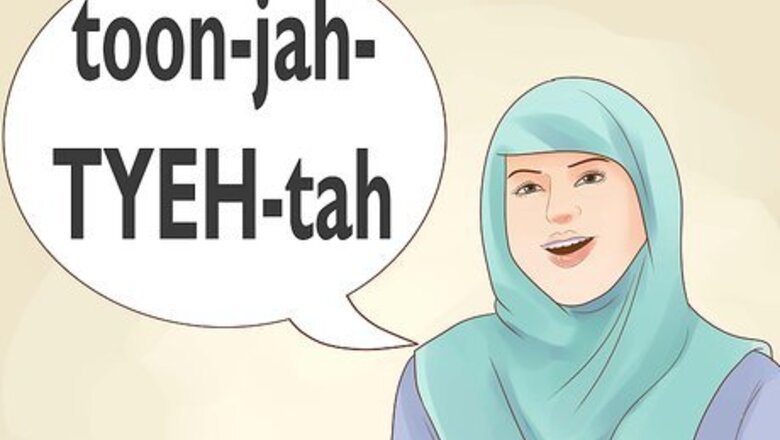
views
Saying Hello in European Languages
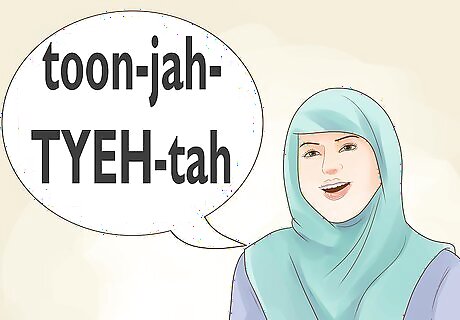
Say hello in Albanian: Hello in Albanian is Tungjatjeta, pronounced "toon-jah-TYEH-tah," which literally means "have a long life." A shorter, more informal way to say hello is Tung, pronounced "toong", or if really informal, "ç'kemi", pronounced "ch-KAY-mee". Albanian is spoken mainly in Albania and Kosovo, though it is also spoken in other areas of the Balkans.
Say hello in Azerbaijani: Hello in Azerbaijani is "Salam", pronounced "suh-lum". Azerbaijani language is official in Azerbaijan, but is also widely spoken in Northern Iran and is very highly intelligible with Turkish (up to 90%).
Say hello in Basque: kaixo (pronounced kai-show), egun on (morning; .pronounced egg-un own), gau on (night; pronounced gow own)
Say hello in Bavarian: Hello in Bavarian is either "Servus (SER-VOOS)," "Seavus (SE-ah-VOOS)," or "Griass God." Bavarian is a regional dialect of German spoken in the German state of Bavaria, western Austria, and Northeastern Italy. It uses German grammar, but takes several root words from Latin.
Say hello in Belarusian: Hello in Belarusian is Вiтаю, pronounced vee-tie-yu. Belarusian is the official language of Belarus, but is also spoken in Russia, Ukraine and Poland.
Say hello in Breton: Hello in Breton is degemer mad. Breton is a Celtic language spoken in Brittany in the northwest of France.
Say hello in Bulgarian: Hello in Bulgarian is zdravei when speaking to one person and zdraveite when speaking to many. Zdrasti is a more informal way to say hello.
Say hello in Bosnian: Hello in Bosnian is dobar dan, pronounced "DOH-bahr dahn". More informal ways to say hello are zdravo, pronounced "ZDRAH-voh" or merhaba, pronounced "MEHR-hah bah". Bosnian is the official language of Bosnia and is essentially the same language as Croatian and Serbian. All three languages used to be known as Serbo-Croatian before the break-up of Yugoslavia.
Say hello in Catalan: Hello in Catalan is hola, pronounced "o-la". Bon dia, pronounced "bon dee-ah" means "good morning", bona tarda, pronounced "bona tahr-dah" means "good afternoon" and bona nit, pronounced "bona neet" means "good night". You can also say just bones, pronounced "bo-nahs" to say an informal hello.
Say hello in Croatian: Hello in Croatian is bok. Dobro jutro means good morning, dobar dan means good day, dobra večer means good evening and laku noć means good night.
Say hello in Czech: Hello in Czech is dobrý den, pronounced "DOH-bree dehn". A more informal way to say hello is ahoj, pronounced "ahoy". Czech is a Slavic language which is mutually intelligible with Slovak.
Say hello in Danish: Hello in Danish is hallo, or informally hej, pronounced "hi". Danish is a Scandinavian language spoken in Denmark and in some parts of Greenland.
Say hello in Dutch: Hello in Dutch is goedendag, pronounced choodendach (ch as in loch, but more voiced), or simply "hallo". Hoi, meaning "hi" is also used informally. Dutch is a Germanic language spoken in the Netherlands and northern Belgium.
Say hello in American English: Informal ways to say hello in American English are hi, hey and yo.
Say hello in British English: British English greetings used in place of hello include How do you do?, Good Morning, Good Afternoon, Good Evening, More informal greetings include watchya, alright, hi and hiya.
Say hello in Estonian: Hello in Estonian is tere, pronounced "TEHR-reh". Estonian is a Finno-Ugric language spoken in Estonia. It is closely related to Finnish.
Say hello in Finnish: Hello in Finnish is hyvää päivää, pronounced "HUU-vaa PIGH-vaa". More informal ways to say hello are moi, terve and hei. Finnish is a Finno-Ugric language spoken only in Finland and by Finns elsewhere in Scandinavia.

Say hello in French: Hello in French is bonjour, pronounced "bohn-ZHOOR". A more informal way to say hello is salut, pronounced "sah-LUU".
Say hello in Frisian: Hello in Frisian is goeie dei, or simply goeie. Frisian is a language spoken in the north of the Netherlands.
Say hello in Irish: Dia duit pronounced "dee-ah gwitch", which literally means "God be with you".
Say hello in Georgian: Hello in Georgian is გამარჯობა, pronounced "gah-mahr-joh-bah" or . Georgian is the official language of Georgia, and it's a Kartvelian language..
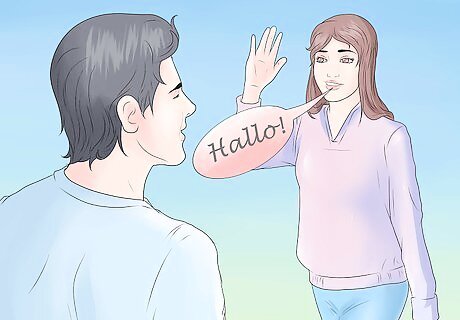
Say hello in German: Hello in German is guten tag, pronounced "gootan taag". More informal ways to say hello are hallo and tag, pronounced "tahg".
Say hello in Austrian and Bavarian German: Hello is grüß Gott, pronounced "gruess got". This is a formal way to say hello in Austria, which literally translates as "salute to God". More informally, you can say servus, pronounced "zair-voos", which can also mean goodbye. Austrian German is an official dialect of standard German, which is spoken in Austria, as well as the province of South Tyrol in Italy.
Say hello in Northern German: moin or moin moin (pronounced moyn), also moinsen.
Say hello in Swiss German:hallo (informal), grüezi (formal, pronounced kind of like grew-tsi), grüessech (formal, used in the Canton of Berne, pronounced grewe-thech).
Say hello in Greek: Hello in Greek is Γεια σας, pronounced "YAH sahss" and literally means "health to you". A more informal way to say hello is Γεια σου, pronounced "YAH soo".
Say hello in Hungarian: Hello in Hungarian is jó napot, pronounced "yoe naupote". More informal ways to say hello are szervusz, pronounced "sairvoose" and szia, pronounced "seeya". The Hungarian language is also referred to as "Magyar".
Say hello in Icelandic: Hello in Icelandic is góðan dag, pronounced "gothan dahg". You can also say hæ, pronounced "hai".
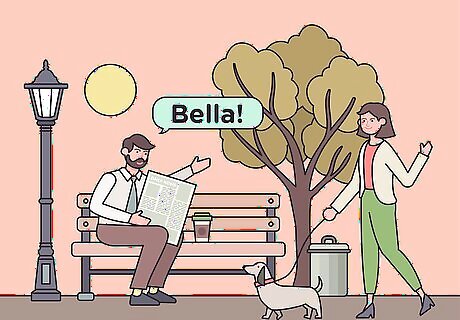
Say hello in Italian: Hello in Italian is buon giorno, pronounced "bwohn geeornoh". More informal ways to say hello are ciào, pronounced chow (use with family or friends), "salve", pronounced salvay and bella which is used to greet younger people.
Say hello in Latin: Hello in Latin is salve, pronounced "sal-way", when talking to one person. Salvete, pronounced "sal-way-tay" is used when talking to more than one person.
Say hello in Latvian: Hello in Latvian is Sveika, pronounced "SVYEH-kah", when speaking to a woman. Sveiks, pronounced "SVEH-eeks" is used when speaking to a man.
Say hello in Lithuanian: Hello in Lithuanian is laba diena. Sveikas, pronounced "SVAY-kahs" is used informally when speaking to a man, while sveika, pronounced "say-kAH" is used informally when speaking to a woman. Labas, pronounced "LAH-bahs" means "hi".
Say hello in Luxembourgish: Hello in Luxembourgish is moïen, pronounced "MOY-en".
Say hello in Macedonian: Hello in Macedonian is Здраво, pronounced "zdravo".
Say hello in Maltese: There isn't a specific word in Maltese for hello, but most people say either "aw gbien" (pronounced "Aaw Jbiiin") or "bongu" (pronounced "Bonjoo") which means good morning.
Say hello in Neapolitan: Hello in Neapolitan is cia or cha.
Say hello in Northern Sami: Hello in Northern Sami is Bures, more informally it's bures bures.
Say hello in Norwegian: Hello in Norwegian is god dag, literally meaning "good day". A more informal way to say hello is hei, pronounced "hay", meaning "hi".
Say hello in Polish: Hello in Polish is dzień dobry, pronounced "jeyn dob-ry". A more informal way to say hello is cześć, pronounced "cheshch".
Say hello in Portuguese: Hello in Portuguese is olá, pronounced "oh-LAH". Other informal ways to say hello are oi, boas and alô.
Say hello in Romanian: Hello in informal Romanian is "bună", pronounced "BOO-nuh", or salut, pronounced "sah-LOOT". You may also use bună dimineața (formal; morning), bună ziua (formal; daytime), bună seara (formal; evening).
Say hello in Russian: Hello in Russian is zdravstvuyte, pronounced "ZDRA-stvooy-tyeh" and spelled "здравствуйте". A more informal way to say hello is privet!, pronounced "pree-vyet" and spelled "привет".
Say hello in Scanian: Hello in Scanian is haja. Hallå is a more informal way to say hello, while go'da is more formal.
Say hello in Serbian: Hello is Serbian is zdravo, pronounced "ZDRAH-voh". A more informal way to say hello is ćao, pronounced "chow".
Say hello in Slovak: Hello in Slovak is dobrý deň, pronounced "dOH-bree deñ". More informal ways to say hello are ahoj, pronounced "ahoy", čau, pronounced "chow" and dobrý, pronounced "dOH-bree".
Say hello in Slovenian: Hello in Slovenian is živjo, pronounced "ZHEE-vyoh" or zdravo, pronounced "ZDRAH-voh".
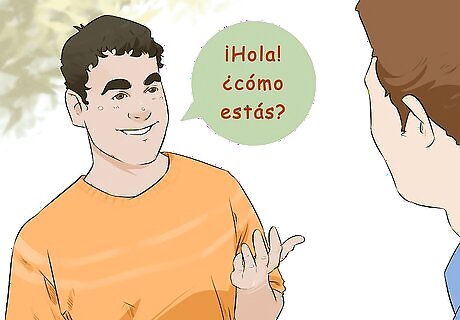
Say hello in Spanish: Hello in Spanish is hola, pronounced with a silent 'h' as "o-la". You can also use the informal alo. Qué onda, pronounced "keh ondah", is a phrase used in South America meaning "what's up". Qué pasa is a phrase used in Spain meaing "what's up". Buenos días means "good morning", buenas tardes means good afternoon and buenas noches meand good evening/goodnight.
Say hello in Swedish: Hello in Swedish is god dag. You can also use the inform tja, pronounced "sha" or hej, pronounced "hey".
Say hello in Turkish: Hello in Turkish is merhaba, pronounced "mehr hah bah". A more informal way to say hello is selam, pronounced "sell um".
Say hello in Ukrainian: Hello in Ukrainian is dobriy den, pronounced "DOH-brihy dehn". A more informal way to say hello is pryvit, pronounced "prih-VEET".
Say hello in Welsh: Hello in Welsh is helo. More informal ways to say hello are shwmae, pronounced "shoe-my" (used in South Wales) and sut mae, pronounced "sit my" (used in North Wales).
Say hello in Yiddish: Hello in Yiddish is sholem aleikhem, which literally means "may peace be unto you". You can also say borokhim aboyem or gut morgn, which mean "good morning", gutn ovnt, which means "good evening", gutn tog which means "good day" and gut shabbos which is only used on the Sabbath.
Saying Hello in Asian Languages
Say hello in Bengali: Hello in Bengali is namaskaar when you're in West Bengal, India, and "as-salam alaykum" in Bangladesh. They differ because of religion.
Say hello in Bodo: Hello in Bodo is wai or oi or oye.
Say hello in Tai or Shan language: Hello in Tai or Shan language is " Mau-Soong-Kha ".
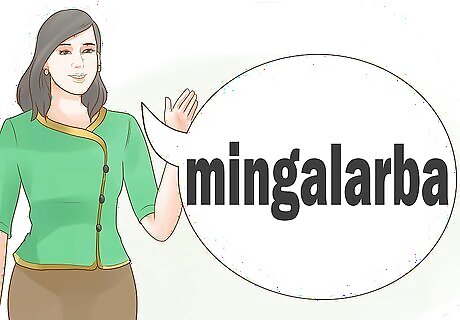
Say hello in Burmese: Hello in Burmese is mingalarba.
Say hello in Cambodian: Hello in Cambodian is chum reap suor, pronounced "jum reap sour". A more informal way to say hello is sous-dey.
Say hello in Chinese: In both Cantonese and Mandarin, hello is written as 你好. In Cantonese this is pronounced as nei ho. In Mandarin it is pronounced as "nee how". You can also just say a Cantonese version of 'hello' pronounced "haa-low." In Mandarin you can also say 早上好 or zǎo shàng hǎo to mean "good morning", pronounced "dsao shung haw". In Taiwan, this is not common and people informally use the shorter 早 zǎo, pronounced "dsao". In Shanghainese, it's written 侬好 and pronounces 'nung-hoh'.
Say hello in Dzongkha: Hello in Dzongkha is kuzu-zangpo, written as "སྐུ་གཟུགས་བཟང་པོ་ལགས།". This language is spoken in Bhutan.
Say hello in Gujarati: Hello in Gujarati is Namaste,Namaskaar or Kemcho.
Say hello in Hindi: Hello in Hindi is नमस्ते, namaste, pronounced "nuh-muh-STAY".
Say hello in Indonesian: Hello in Indonesian is simply halo or, more informally, he, pronounced "hey". The most formal is "mari" but is only used to say hello when passing by someone.
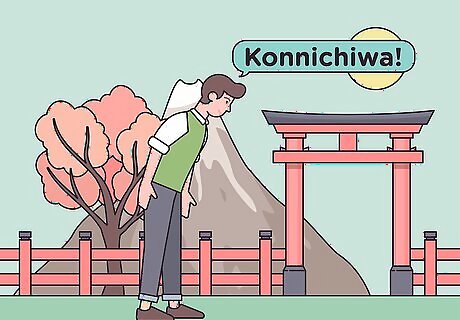
Say hello in Japanese: Hello in Japanese is こんにちは konnichi ha, pronounced "ko-n-ni-chi-wa". You can also use doumo, pronounced "doh-moh" which is an informal way of thanking/greeting.
Say hello in Kannada: Hello in Kannada is namaskara.
Say hello in Kazakh: Hello in Kazakh is Salem (when you talk to same age or younger people). More respectful way (usually to elders) is to say "Assalamu Aleikum". When greeted first, the response should follow "Wa Aleikum Esselam". Kalay zhagday (How are you?)
Say hello in Konkani: Hello in Konkani is Namaskar or Namaskaru (I bow to thee, formal)', Dev baro dis div (may God bless you with a good day, informal)
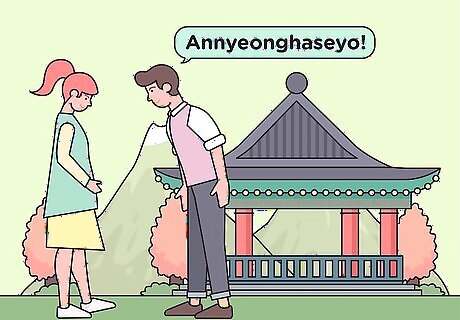
Say hello in Korean: Hello in Korean is 안녕하세요, pronounced ahn nyeong ha se yo. You can also use 안녕, pronounced ahn nyeong which is more informal and can also be used to say goodbye.
Say hello in Lao: Hello in Lao is sabaidee, pronounced "sa-bai-dee".
Say hello in Malayalam: Hello in Malayalam is namaskkaram.
Say hello in Malaysian: Hello in Malaysian is selamat datang, pronounced "seh-la-mat dah-tang", which can also mean "welcome". You can also say apa khabar, pronounced "a-pa ka-bar", which can also mean "how are you". Hai, pronounced "hi" is the informal way to say hello.
Say hello in Marathi: Hello in Marathi is namaskar.
Say hello in Mongolian: Hello in Mongolian is sain baina uu?, pronounced "saa-yen baya-nu". A more informal way to say hello is sain uu?, pronounced "say-noo".
Say hello in Nepal Bhasa: Hello in Nepal Bhasa is ज्वजलपा, pronounced "jwa-jalapa".
Say hello in Nepali: Hello in Nepali is namaskar(नमस्कार) or namaste(नमस्ते) . A more informal way to say hello is ke cha(के छ) or kasto cha(कस्तो छ), whose literal translations are "What is it?" and "How is it".
Say hello in Odia: Hello in Odia is namashkaar.
Say hello in Punjabi: Hello in Punjabi is sat sri akaal ji, or more informally sat sri akal.
Say hello in Pashto/Pakhto: Hello in Pakhto/Pashto is "Staray ma she", literally meaning, "don't get tired/may you not get tired". (Be at ease.) "Assalamu alaikum" is also a common greeting.
Say hello in Rajasthani (Marwari): Hello in Rajasthani is khamma ghani sa or ram ram sa.
Say hello in Sinhala: Hello in Sinhala is a`yubowan, pronounced "au-bo-wan" which means "long live". You can also say kohomada?, pronounced "ko-ho-ma-da", meaning "how are you?"
Say hello in Sundanese: Hello in Sundanese differs according to the time of day. Wilujeng énjing means "good morning", Wilujeng siang means "good afternoon", Wilujeng wengi means "good evening and Wilujeng kulem means "good night". This language is spoken in the Banten and West Java areas of Indonesia.
Say hello in Tagalog: Asking someone in the Philippines how they are is "Kumusta ka?", or more informally, "kumusta?"
Say hello in Taiwanese (Hokkien): Hello in Taiwanese is Li-ho.
Say hello in Tamil: Hello in Tamil is vanakkam.
Say hello in Telugu: Hello in Telugu is namaskaram or baagunnara, which means "how are you?"
Say hello in Thai: Hello in Thai issawa dee-ka, when said by a female, or sawa dee-krap when said by a male.
Say hello in the Lhasa dialect of Tibetan: Hello in Tibetan is tashi delek.
Say hello in the Amdo dialect of Tibetan: Hello is cho demo.
Say hello in Uzbek: Hello in Uzbek is Assalomu Alaykum. A more informal way to say hello is salom.
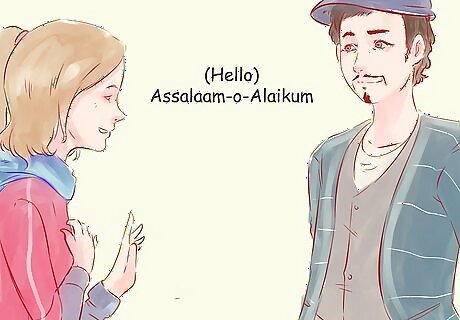
Say hello in Urdu: Hello in Urdu is adaab or salam or as salam alei kum.
Say hello in Vietnamese: Hello in Vietnamese is xin chào, pronounced "sin CHOW".
Saying Hello in African Languages
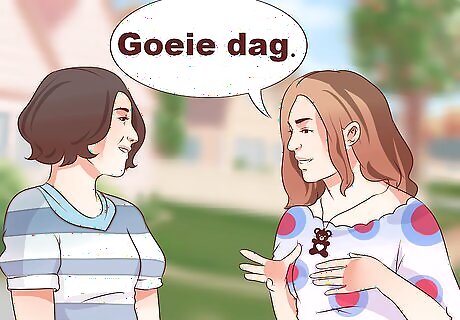
Say hello in Afrikaans: Hello in Afrikaans is just hallo pronounced "hu-llo". A more formal greeting is goeie dag. Afrikaans is spoken in South Africa and Namibia, along with parts of Botswana and Zimbabwe.
Say hello in Amharic: Hello in Amharic is tena yistelegn, pronounced "teen-as-tell-an", which is very formal. You can also use the informal tadiyas, pronounced "tah-dee-yas", or "salam". Amharic is a Semitic language and is the official working language of Ethiopia.
Say hello in Chichewa: Hello in Chichewa is moni bambo! to a male and moni mayi! to a female. Muribwanji, pronounced "moori-bwanji" is used often as a generalized greeting to everyone. Chichewa is also known as Nyanja and is the national language of Malawi. It is also spoken in Zambia, Mozambique and Zimbabwe.
Say hello in Chubby: Hello in Chubby is shabe yabebabe yeshe. Chubby is a Somalian language.
Say hello in Dioula: Hello in Dioula is in-i-che. This language is spoken in the Ivory Coast and Burkina Faso.
Say hello in Edo: Hello in Edo is kóyo. This language is spoken in Nigeria.
Say hello in Hausa: The formal greeting in Hausa is the Muslim salama alaikum. A more informal greeting is sannu. Hausa is one of the most widely spoken African languages, it is spoken by approximately 34 million speakers. It's spoken natively in Nigeria and Niger, but is used as a lingua franca in many other African countries.
Say hello in Igbo: Hello in Igbo is ndêwó, pronounced "in-DEEH-WO". An informal way to say it is kedụ, pronounced 'keh-DOO'. Igbo is spoken by the Igbo people in southeastern Nigeria.
Say hello in Lingala: Hello in Lingala is mbote. Lingala is a Bantu language spoken in the Congo.
Say hello in Northern Sotho: Hello in Northern Sotho is dumelang when speaking to more than one person and dumela when addressing a single person. Northern Sotho is a Bantu language spoken in South Africa.
Say hello in Oshikwanyama: Say hello in Oshikwanyama differs depending on whether you are saying hello to a male or female. To a female you would say wa uhala po, meme?. To a male you would say wa uhala po, tate?. A more informal way to say hello is ongaipi?, which translates as "how is it?". Oshikwanyama is also known as just Kwanyama and is a national language of Namibia and Angola.
Say hello in Oromo: Hello in Oromo is asham. You can also say akkam?, which means "how are you?" and nagaa, which means "peace by with you." Oromo is an Afro-Asiatic language spoken by the Oromo people in Ethiopia and northern Kenya.
Say hello in Somali: Hello in Somali is salaam alaykum. This language is spoken in Somalia, Djibouti, Yemen and Ethiopia.
Say hello in Swahili: Hello in Swahili is jambo or hujambo, which loosely translates as "how are you?". You may also say habari gani, which means "what is the news?". Swahili is a Bantu languages spoken by the Swahili communities in Kenya, Tanzania, Uganda, Rwanda, Burundi, Mozambique and the Democratic Republic of Congo.
Say hello in Tarifit : Hello in Tarifit is Azul"" , which literally means "peace". You can also say "ola" which is a modern form of the Spanish "Hola", Tarifit is spoken by 8 million speakers in Arrif (Northern Africa) and Europe.
Say hello in Tigrinya: Hello in Tigrinya is selam, which literally means "peace be with you". You can also say haderkum which means "good morning" and t'ena yehabeley which means "may good health be upon you". This language is spoken in Ethiopia and Eritrea.
Say hello in Tshiluba: Hello in Tshiluba is moyo. Tshiluba, also known as Luba-Kasai, is a Bantu language and one of the national languages of the Democratic Republic of Congo.
Say hello in Tsonga: In Tsonga, you say minjhani when saying hello to adults, but you say kunjhani when greeting your peer group or your juniors. This language is spoken in South Africa.
Say hello in Wolof: Hello in Wolof is salaam aleekum.
Say hello in Yoruba: Hello in Yoruba differs according to the time of day. E kaaro means "good morning", E kaasan means "good afternoon", E kaaale means "good evening and O da aaro means "good night". Yoruba is a Niger-Congo language spoken by the Yoruba people in West Africa.
Say hello in Zulu: Hello in Zulu is sawubona for one person or sanibonani for multiple people. Sawubona translates to mean "we see you" and you should respond by saying yebo, meaning "yes". Zulu is a Bantu language spoken in South Africa.
Saying Hello in Middle-Eastern Languages
Say hello in Arabic: Hello in Arabic is As-salām 'alaykum. This is a formal greeting which is literally translated as "peace upon you". Other common, though more informal, ways to say hello are mar-ha-ban" and ahlan. Arabic is widely spoken across the Middle East and North Africa. Say hello in Egyptian Arabic: The formal way to say hello in Egyptian Arabic is is salām 'alaykum". The informal way is "ahlan".
Say hello in Armenian:Barev dzez is the formal way to say hello in Armenian, while Barev on its own is the informal way. Armenian is spoken in the Republic of Armenia, as well as in large communities of Armenian diaspora.
Say hello in Hebrew: Hello in Hebrew is shalom. It also means "goodbye" and "peace". More informal greetings include hi and ma korae?, which literally means "what's happening" or "what's up."
Say hello in Kurdish: Hello in Kurdish is silaw, pronounced "slaw". The Persian salaam and common Islamic greeting, "as-salaamu' alaykum" is also used. Kurdish is spoken by about 30 million Kurds in western Asia.
Say Hello in Pasho: In Pashto, an Iranic language (like Kurdish and Persian) ethnic to Afghanistan, you say hello by saying "pakheyr" or "khe chare." The common Islamic greeting, "as-salaamu' alaykum" is also used.
Say hello in Persian: Hello in is salaam or do-rood. The word salaam is an abbreviation, the full version being as-salaam-o-aleykum, as in all Islamic societies.
Saying Hello in Native American Languages
Say hello in Alibamu: Hello in Alibamu is chíkmàa. This is a southeastern Native American language.
Say hello in Cayuga: Hello in Cayuga is scan noh. This is a Northern Iroquois language.
Say hello in Cree: Hello in Cree is tansi, pronounced "tawnsay". Cree is an Algonquian language spoken by Native Americans across Canada.
Say hello in Haida: Hello is kii-te-daas a. This language is spoken on Haida Gwaii (formerly Queen Charlotte Islands), Canada.
Say hello in Hopi: Hello in Hopi is ha'u, pronounced "hah-uh". However this word is not used as often as it is in English. It's more traditional to greet someone by saying um waynuma?, which literally translates as "you're around?". Hopi is a Uto-Aztecan language spoken by the Hopi people in northeastern Arizona, USA.
Say hello in Inuktitut: Hello in Inuktitut is ainngai, pronounced "eye-NGIE". Inuktitut is an Eskimo language spoken by the Inuit of Alaska.
Say hello in Kanien'kéha: Hello in Kanien'kéha is Kwe kwe, pronounced "gway gway". Kanien'kéha is an Iroquoian language spoken by the Mohawk people of North America.
Say hello in Nahuatl: Hello in Nahuatl is niltze, pronounced "neel-TSAY", tialli or pialli. Nahuatl is an Uto-Aztecan language spoken by the Nahua people in Central Mexico.
Say hello in Navajo: Hello in Navajo is yá'át'ééh, pronounced "yah-at-eh". This word also means "good". Navajo is an Athabaskan language spoken by the Navajo people, who are based mainly in the southwestern United States. Navajo is the most widely spoken Native American language north of the US-Mexico border.
Saying Hello in Other Languages
Say hello in A'Leamona: Hello in A'Leamona is tel nĩdo, pronounced "tehl-neye-doe". It literally means "good day".
Say hello in American Sign Language (ASL): To say "hello," squeeze the fingers in your right hand together, touch the tips of your fingers to your forehead, palm facing outward, and move your hand away from your forehead in a sort of saluting motion.
Say hello in Bremnian: Hello in Bremnian iskoali, pronounced "kowalee".
Say hello in British Sign Language (BSL): Dominant hand wave, from core to outside with the palm facing towards recipient as the hand moves bring it into a thumbs up gesture (Formal 'Hello'), Give two thumbs up (Informal Literal Translation 'well?')
Say hello in Cape Verdean Creole: Hello is oi, olá, entao or bon dia. Cape Verdean Creole is a Portuguese-based creole spoken on the islands of Cape Verde.
Say hello in Chamorro: Hello in Chamorro is håfa adai or its shortened form, håfa?. Other more informal greetings include howzzit bro/bran/prim/che'lu? and sup. Chamorro is a Spanish-influenced Austronesian language spoken on the American territory of Guam and in the Commonwealth of the Northern Mariana Islands.
Say hello in Cook Islands Maori: Hello is kia orana. Cook Islands Maori is the official language of the Cook Islands.
Say hello in Esperanto: The formal way to say hello in Esperanto is saluton, the informal way is sal. Esperanto is a constructed auxiliary language that was invented in the late 19th century as a means for speakers of different languages to communicate in a politically neutral way.
Say hello in Fijian: The formal way to say hello in Fijian is bula Vinaka, pronounced 'buh-la vina-kah'. A more informal way to say hello is bula Uro. Fijian is an Austronesian language spoken in Fiji.
Say hello in Hawaiian: Hello in Hawaiian is aloha, pronounced ah-low-ha. Hawaiian is a Polynesian language spoken in Hawaii.
Say hello in Jamaican Patois: Hello in Jamaican Patois is whaa gwaan", literally "what's going on?". Yes sah!" is another term used to greet people. Jamaican Patois is an English based creole language with West African influences. It is spoken on the island of Jamaica and by the Jamaican diaspora.
Say hello in Maldivian: The formal way to say hello in Maldivian is Assalaamu Alaikum. The informal way is Kihineh?, which literally means "how?". Maldivian is the national language of the Maldives.
Say hello in Māori: Hello in Māori is kia ora, pronounced "kia o ra". It literally means "be well/healthy" and has also been adopted by English speakers in New Zealand.
Say hello in Marshallese: Hello in Marshallese is Iakwe, pronounced "YAH kway". Many Marshallese also say Iakwe iakwe to sound more casual. To greet someone in the morning, say Iakwe in jiboñ, pronounced "YAH kway in jee BONG". To greet someone in the evening, say Iakwe in jota, pronounced "YAH kway in JO ta". Marshallese is also known as Ebon, and is spoken on the Marshall Islands.
Say hello in Naokien: The formal way to say hello is atetgrealot, the informal way is atetel.
Say hello in Niuean: The formal way to say hello in Niuean is faka lofa lahi atu. The infrmal way is fakalofa. Niuean is a Polynesian language closely related to Tongan. It is spoken on the island of Niue, as well as the Cook Islands, New Zealand and Tonga.
Say hello in Palauan: Hello in Palauan is alii, pronounced "ah-lee". Palauan is one of the official languages of the Republic of Palau in Micronesia.
Say hello in Samoan: The formal way t say hello in Samoan is talofa, the informal way is malo. Samoan is a Polynesian language spoken on the Samoan Islands.
Say hello in Sulka: Saying hello in Sulka depends on the time of day. In the morning you would say marot, pronounced "mah-rote" (rolled r and lengthened o). In the afternoon you would say mavlemas (v is pronounced as a fricative b), and in the evening you would say masegin (g is pronounced as a fricative). Sulka is a language spoken in Papua New Guinea with about 3000 speakers.
Say hello in Tagalog: The closest equivalent to the word hello in Tagalog is Kumustá? which is "how are you?" (from the Spanish greeting). However, Filipinos commonly greet each other in English, just using the word "hello". Tagalog is one of the major languages of the Philippines.
Say hello in Tahitian: Hello in Tahitian is Ia orana, pronounced "yo-ra-nah". The Tahitian language is spoken on the islands of Tahiti, Moorea and Bora Bora and only contains about 1000 words.
Say hello in Tetum: There are several ways to say hello in Tetum, depending on the time of day. Bondia is used in the morning, botarde is used in the afternoon and bonite is used in the evening. Tetum is the national language of East Timor.
Say hello in Tok Pisin: Hello in Tok Pisin is gude. Tok Pisin is an English pidgin language spoken in Papua New Guinea.
Say hello in Tongan: Hello in Tongan is Malo e lelei. Tongan is spoken in Tonga, which is a country made up of about 170 islands in Western Polynesia.
Say hello in Woiworung: Hello in Woiworung is womenjeka, pronounced 'woh-men-jeh-kah'. Woiworung is an Australian Aboriginal language spoken by the Woiworung people of Central Victoria, Australia.
Saying Hello in Fictional Languages
Say hello in D'ni: Hello in D'ni is shorah, which also means goodbye or peace. D'ni is a language created for the computer games Myst and Riven.
Say hello in Double Dutch: Hello in Double Dutch is Hutch-e-lul-lul-o. Other greetings include gug-o-o-dud mum-o-rug-nun-i-nun-gug which means good morning, gug-o-o-dud a-fuf-tut-e-rug-nun-o-o-nun which means good afternoon and gug-o-o-dud e-vuv-e-nun-i-nun-gug which means good evening. Double Dutch is a nonsense language used mainly by English speakers.
Say hello in Gibberish: Hello in Gibberish is h-idiguh-el l-idiguh-o, while hi is h-diguh-i. Gibberish is a secret language made up of nonsense sounding words that is spoken in several English speaking countries. A number of Gibberish dialects exist.
Say hello in Klingon: NuqneH?, pronounced "nook-neck", which literally means "what do you want?"
Say hello in Na'vi: The informal way to say hello is Kaltxì, pronounced "kal-T-ì" with an emphasis on the "T". The formal way to say hello is Oel ngati kameie, pronounced "o-el nga-ti kamei-e". The Na'vi language was constructed for the film Avatar.
Say hello in Pirate: Rather than a traditional hello, pirates usually greet each other by saying Arrrguh, pronounced "are-g-uh", with emphasis on the "are", usually with rolled r. Ahoy Matey, pronounced "ah-hoi mate-ey" is usually used when speaking to another crew member.
Say hello in Pig Latin: Hello in Pig Latin is ellohay. You can also say Eyhay which means "hey", and atswhay upay? which means "what's up?". Pig Latin is a language game used primarily by English speakers.
Say hello in Ung Tongue: Hello in Ung Tongue is pronounced "Hung-ee-lung-lung-oh". This is a made-up language, like Pig latin.
Say Hello in Doge Tak: Hello in Doge Tak is Hoi, Hi, or yo.




















Comments
0 comment